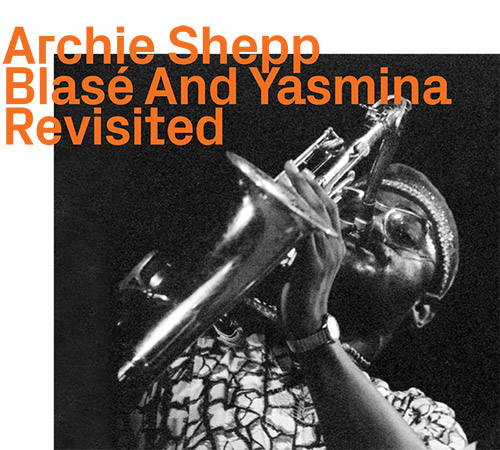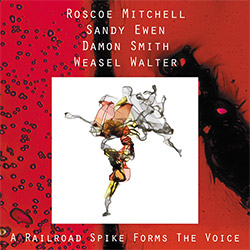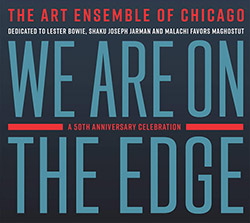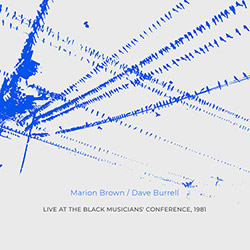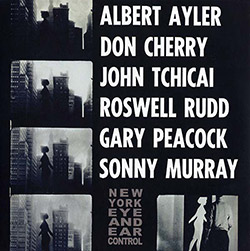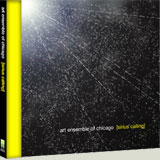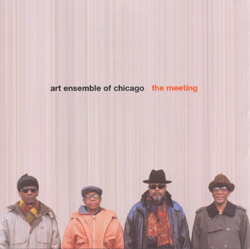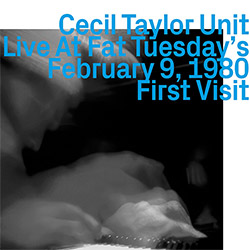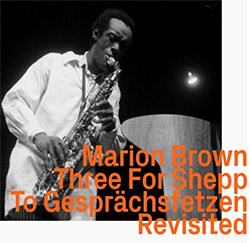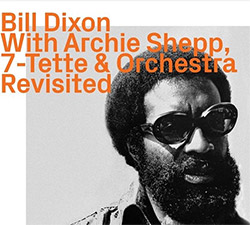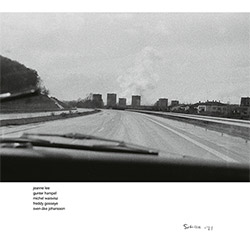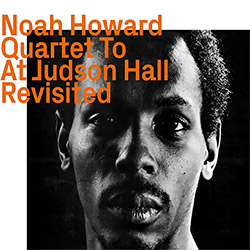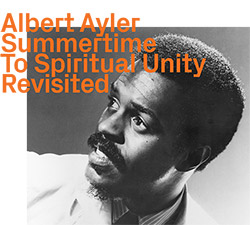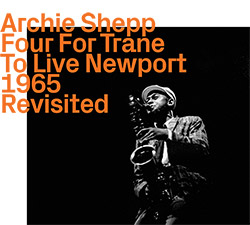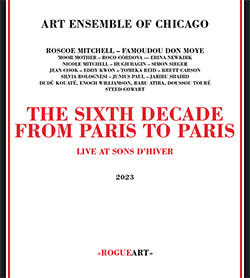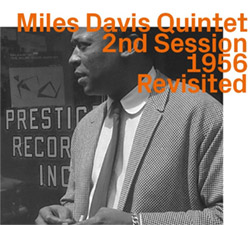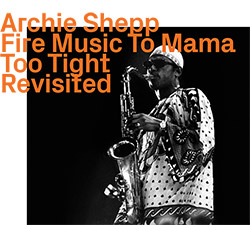
Revisiting two of Archie Shepp's 1969 recordings released on the BYG label as Blasé, and title track to Yasmina, three tracks featuring the vocals of Jeanne Lee, with four band configurations including Dave Burrell, Malachi Favors, Lester Bowie, Roscoe Mitchell, Sunny Murray, Philly Joe Jones, &c., beautifully remastered to bring to light Shepp's pan-stylistic impulses.
In Stock
Quantity in Basket: None
Log In to use our Wish List
Shipping Weight: 2.00 units
Sample The Album:
Archie Shepp-tenor saxophone
Jeanne Lee-voice
Chicago Beau-harmonica
Julio Finn-harmonica
Dave Burrell-piano
Malachi Favors-double bass
Philly Joe Jones-drums
Roscoe Mitchell-bass saxophone
Sunny Murray-drums
Art Taylor-rhythm logs
Laurence Devereaux-balafon
Click an artist name above to see in-stock items for that artist.
UPC: 752156111528
Label: ezz-thetics by Hat Hut Records Ltd
Catalog ID: ezz-thetics 1115
Squidco Product Code: 29967
Format: CD
Condition: New
Released: 2021
Country: Switzerland
Packaging: Cardboard Gatefold
Recorded in Paris, France, on August 12th and 16th, 1969.
"The sessions Archie Shepp led for BYG over five days in August 1969 is a body of work that merits revisiting outside the context of the entire Actuel series and the well-trodden trope of the African American avant-garde in radical Paris. The resulting albums were not ad hoc firestorms; rather, they were considered statements mirroring the pan-stylistic project of his Impulse! albums. Shepp's BYGs are occasionally framed as somewhat anomalous items in his discography, but their subject is the same as that of his other albums: the African American music continuum.
The last of the three BYG studio albums, Blasé foreshadowed Shepp's next steps. The presence of Jeanne Lee is routinely and deservedly foregrounded in the praise critics heap upon the album; but Blasé is often treated as a one-off, even though they eventually recorded Archie Shepp & Jeanne Lee at the 1984 Leverkusen Jazzdays, where they reprised "Sophisticated Lady." Working with Lee, however, was not a move he made out of the blue, as Blasé was recorded when singers were about to become increasingly prominent on Shepp's albums.
At that time, Shepp's only issued performance featuring a singer was the 1965 title track of On This Night, a mashing of art song and mainstream jazz featuring soprano Christine Spencer. Only ten days after the Blasé session, Shepp enlisted China-Lin Sharpe to sing another Ellington standard, "I Got It Bad (And That Ain't Good)," included on For Losers, a foreshadowing album that also featured "Stick 'Em Up," a succinct R&B tune from early 1969 featuring Leon Thomas, Doris Troy and Tasha Thomas. Shepp's use of widely contrasting materials and singers on For Losers pinnacled with his profound early 1970s triptych: Things Have Got to Change; Attica Blues; and The Cry of My People. For each of those albums, Shepp recruited several singers, including the booming Joe Lee Wilson, the radiant Peggie Blue, and the endearing 7-year-old Waheeda Massey.
Lee single-handedly cohered a comparably varied program on Blasé; her versatility is central to Shepp molding the album's disparate materials into a compellingly contoured shape. Even though no single volume in Lee's discography encompasses all of her gifts, Blasé comes close to being comprehensive. She uses earthy, flowing vocalese to play off the downhome groove of "My Angel," dovetailing with hoarse tenor and wheezing harmonicas. Her smoky, melancholic timbre belies the confrontative lyrics of the title piece. A spiritual that Mahalia Jackson also sang in hushed tones, Lee's reading of "There is a Balm in Gilead" is a study in understated intensity. And, she squeezes every last drop of sensuality from the cosmopolitan Ellington chestnut. These are performances that continue to inspire singers like Elaine Mitchener.
Given how each panel of Shepp's Impulse! triptych was the product of multiple sessions, taking weeks, if not months to complete, the making of Blasé in a single day is remarkable. The BYGs reinforced Shepp's bona fides as a leader, as he marshalled the rare confluence of diverse artists then streaming through Paris for his BYG dates: aspiring post-Coleman avant-gardists Clifford Thornton and members of Art Ensemble of Chicago; veteran hard bop stylists Philly Joe Jones, Hank Mobley and Art Taylor; and free ranging blues harp players Chicago Beau and Julio Finn. On Blasé, Shepp's keen instincts for matching musician with material is particularly evident in his enlisting Lester Bowie for the classic reading of "There is a Balm in Gilead."
Beginning with the inclusion of both Ellington's "Prelude to a Kiss" and Jobim's "The Girl from Ipanema" on Fire Music, Shepp regularly used jarring juxtapositions to promote his pan-stylism, which was predicated on an approach to history akin to the Faulknerian idea that the past has not passed; for Shepp, it just needed to be placed on the ramparts. On his prior Impulse! albums, Shepp employed various gambits to this end, including ending the tumultuous side-long "A Portrait of Robert Thompson (as a young man)" on Mama Too Tight with a lacerating, irony-drenched romp on John Philip Sousa's "King Cotton." On Blasé, Shepp took a different tact. The four tracks with Lee were not of sufficient duration to be issued alone, nor did they contain the explosive extended improvisations shaping albums like The Magic of Ju Ju. Subsequently, Shepp ended Blasé with "Touareg," an unrelentingly visceral workout with Jones and Malachi Favors that manages to present as a scathing summation, not a gratuitous appendix.
The inclusion of the 20-minute title piece from Yasmina, A Black Woman - the first of the three albums he recorded for BYG after arriving in Paris from the Pan-African Festival in Algier - widens the scope of this retrospective volume. The experience of having recently performed with North African musicians is evidenced by Shepp's use of multiple percussionists, his ecstatic singing, and the kernel-like scalar material of his herculean solo. The performance is a reminder that the source of the African American music continuum is Africa."-Bill Shoemaker, October 2020

The Squid's Ear!
Artist Biographies
• Show Bio for Archie Shepp "Archie Shepp (born May 24, 1937) is an American jazz saxophonist. Shepp was born in Fort Lauderdale, Florida, but raised in Philadelphia, Pennsylvania. He studied piano, clarinet, and alto saxophone before focusing on tenor saxophone. He occasionally plays soprano saxophone and piano. He studied drama at Goddard College from 1955 to 1959. He played in a Latin jazz band for a short time before joining the band of avant-garde pianist Cecil Taylor. Shepp's first recording under his own name, Archie Shepp - Bill Dixon Quartet, was released on Savoy Records in 1962 and featured a composition by Ornette Coleman. Along with John Tchicai and Don Cherry, he was a member of the New York Contemporary Five. John Coltrane's admiration led to recordings for Impulse! Records, the first of which was Four for Trane in 1964, an album of mainly Coltrane compositions on which he was joined by trombonist Roswell Rudd, bassist Reggie Workman and alto player John Tchicai. Shepp participated in the sessions for Coltrane's A Love Supreme in late 1964, but none of the takes he participated in was included on the final LP release (they were made available for the first time on a 2002 reissue). However, Shepp, along with Tchicai and others from the Four for Trane sessions, then recorded Ascension with Coltrane in 1965, and his place alongside Coltrane at the forefront of the avant-garde jazz scene was epitomized when the pair split a record (the first side a Coltrane set, the second a Shepp set) entitled New Thing at Newport released in late 1965.File:Archie Shepp interview 1978.webmPlay media(video) Interview from 1978, Archie Shepp discusses jazz trends, poverty, politics, civil rights, culture and society. In 1965, Shepp released Fire Music, which included the first signs of his developing political consciousness and his increasingly Afrocentric orientation. The album took its title from a ceremonial African music tradition and included a reading of an elegy for Malcolm X. Shepp's 1967 The Magic of Ju-Ju also took its name from African musical traditions, and the music was strongly rooted in African music, featuring an African percussion ensemble. At this time, many African-American jazzmen were increasingly influenced by various continental African cultural and musical traditions; along with Pharoah Sanders, Shepp was at the forefront of this movement. The Magic of Ju-Ju defined Shepp's sound for the next few years: freeform avant-garde saxophone lines coupled with rhythms and cultural concepts from Africa. Shepp was invited to perform in Algiers for the 1969 Pan-African Cultural Festival of the Organization for African Unity, along with Dave Burrell, Sunny Murray, and Clifford Thornton. This ensemble then recorded several sessions in Paris at the BYG Actuel studios. Shepp continued to experiment into the new decade, at various times including harmonica players and spoken word poets in his ensembles. With 1972's Attica Blues and The Cry of My People, he spoke out for civil rights; the former album was a response to the Attica Prison riots. Shepp also writes for theater; his works include The Communist (1965) and Lady Day: A Musical Tragedy (1972). Both were produced by Robert Kalfin at the Chelsea Theater Center. In 1971, Shepp was recruited to the University of Massachusetts Amherst by Randolph Bromery, beginning a 30-year career as a professor of music. Shepp's first two courses were entitled "Revolutionary Concepts in African-American Music" and "Black Musician in the Theater". Shepp was also a professor of African-American Studies at SUNY in Buffalo, New York. In the late 1970s and beyond, Shepp's career went between various old territories and various new ones. He continued to explore African music, while also recording blues, ballads, spirituals (on the 1977 album Goin' Home with Horace Parlan) and tributes to more traditional jazz figures such as Charlie Parker and Sidney Bechet, while at other times dabbling in R&B, and recording with various European artists including Jasper van't Hof, Tchangodei and Dresch Mih‡ly. Shepp is featured in the 1981 documentary film Imagine the Sound, in which he discusses and performs his music and poetry. Shepp also appears in Mystery, Mr. Ra, a 1984 French documentary about Sun Ra. The film also includes footage of Shepp playing with Sun Ra's Arkestra. Since the early 1990s, he has often played with the French trumpeter Eric Le Lann. In 1993, he worked with Michel Herr to create the original score for the film Just Friends. In 2002, Shepp appeared on the Red Hot Organization's tribute album to Fela Kuti, Red Hot and Riot. Shepp appeared on a track entitled "No Agreement" alongside Res, Tony Allen, Ray Lema, Baaba Maal, and Positive Black Soul. In 2004 Archie Shepp founded his own record label, Archieball, together with Monette Berthomier. The label is located in Paris, France, and includes collaborations with Jacques Coursil, Monica Passos, Bernard Lubat, and Frank Cassenti." ^ Hide Bio for Archie Shepp • Show Bio for Jeanne Lee "Jeanne Lee (January 29, 1939 - October 25, 2000) was an American jazz singer, poet and composer. Best known for a wide range of vocal styles she mastered, Lee collaborated with numerous distinguished composers and performers who included Gunter Hampel, Ran Blake, Carla Bley, Anthony Braxton, Marion Brown, Archie Shepp, Mal Waldron, and many others. Jeanne Lee was born in New York City. Her father S. Alonzo Lee was a concert and church singer whose work influenced her at an early age. She was educated at the Walden School (a private school), and subsequently at Bard College, where she studied child psychology, literature and dance. During her time at Bard she created choreography for pieces by various classical and jazz composers, ranging from Johann Sebastian Bach to Arnold Schoenberg. In 1961 she graduated from Bard College with a B.A. degree. That year she performed as a duo at the Apollo Theater's Amateur Night contest with pianist Ran Blake, a fellow Bard alumnus, and after winning made her first record, The Newest Sound Around. The album gained considerable popularity in Europe, where Lee and Blake toured in 1963, but went unnoticed in the US. At this point, Lee's major influence was Abbey Lincoln. During the mid-1960s Lee was exploring sound poetry, happenings, Fluxus-influenced art, and other multidisciplinary approaches to art. She was briefly married to sound poet David Hazelton, and composed music for the sound poetry by poets such as Dick Higgins and Alison Knowles, becoming active in the California art scene of the time. In the late 1960s she returned to the jazz scene and started performing and recording, quickly establishing herself as one of the most distinctively independent and creative artists in the field. Already a few years after her return she had a major role in Carla Bley's magnum opus, Escalator over the Hill (1971), and recorded albums with eminent musicians including Archie Shepp and Marion Brown. In 1967, while in Europe, Lee began a long association with vibraphonist and composer Gunter Hampel, whom she eventually married. They had a son, Ruomi Lee-Hampel, and a daughter, Cavana Lee-Hampel. In 1976 she represented the African-American spiritual musical tradition in John Cage's Apartment House 1776, which was composed for the U.S. Bicentennial. The experience inspired Lee to devote more attention to her composing, and create extended works. The immediate result was Prayer for Our Time, a jazz oratorio. Lee continued to perform and make recordings until her death in 2000, recording for labels such as Birth, BYG Actuel, JCOA, ECM, Black Saint/Soul Note, OWL and Horo. She sang on a large number of albums by Gunter Hampel. In her late years, she ran the Jeanne Lee Ensemble, which performed a fusion of poetry, music and dance, and collaborated and toured with pianist Mal Waldron. Lee was also active as educator. She received a MA in Education from New York University in 1972 and taught at various institutions both in the US and in Europe. She published a number of short features on music for Amsterdam News and various educational writings, including a textbook on the history of jazz music for grades four through seven. Lee died from cancer in 2000 in Tijuana, Mexico. She was survived by her husband and children." ^ Hide Bio for Jeanne Lee • Show Bio for Dave Burrell "Distinguished composer-pianist Dave Burrell is an African-American performing artist of singular stature on the international contemporary music scene. His dynamic compositions with blues and gospel roots recall the tradition of Jelly Roll Morton, James P. Johnson and Duke Ellington, as well avant garde composers Thelonious Monk and John Coltrane. Dave and his parents moved from New York to Hawaii in 1946. After majoring in music at the University of Hawaii, he enrolled at Berklee College of Music in Boston, Massachusetts graduating with degrees in composition/arranging and performance in 1965. He moved to New York City, where he quickly established himself as one of the most innovative and original pianists, collaborating with the emerging leaders in contemporary jazz, joining the groups of saxophonists Marion Brown, Pharoah Sanders and Archie Shepp. [...] Dave Burrell has 40 recordings under his own name, among them High, High Two, Echo, La Vie de Boheme, After Love, In-Sanity, Only Me, Dreams, Black Spring, Lush Life, 'Round Midnight, Teardrops for Jimmy, Windward Passages, Daybreak, Brother to Brother, In Concert, Jelly Roll Joys, Esquisses for a Walk, Live at Caramoor, Changes and Chances, Recital, Expansion, Margy Pargy, Momentum, Dave Burrell Plays His Songs, No Fools No Fun, Dave Burrell Conception. Dave Burrell appears on 130 recordings, among them his pivotal recordings with tenor saxophonists Archie Shepp: Live from Pan-African Festival, There is a Trumpet in MySoul, Blasé, Kwanza, Attica Blues, Cry of My People, Montreaux One, Montreaux Two, Lover Man, Pharoah Sanders: Tauhid, Marion Brown: Jubalee, Three For Shepp, Live in Japan, David Murray: Hope Scope, Lovers, Deep River, Ballads, Spirituals, Remembrances, Lucky Four, Picasso, Windward Passages. Other important recordings are 360 Degree Music Experience: From Ragtime to No Time, In:sanity, Grachan Moncur: New Africa, Sunny Murray: Homage to Africa, Bob Stewart: Here and Now, and Consequences with drummer Billy Martin. The Inside Songs of Curtis Mayfield and Essence of Ellington with William Parker's Ensembles. Horo Records in Italy recently released a live duo recording, No Fools No Fun with Ellington-drummer Sam Woodyard from a 2 months long engagement in Paris (1979). Dave Burrell appears on the Argentine saxophonist Roberto Pettinato's Sony/Columbia Argentina Records releases Purity and Same Egg. A live duo recording with guitarist Garrison Fewell, New Earth to be released in 2015. A frequent lecturer, Burrell's Master Classes include Strasbourg Conservatory, Tremblay Conservatory (Paris), Conservatoire Municipal (Paris), Guildhall School of Music and Dance (London), Columbia University, New York University, Queens College, Bard College, New York. University of Pennsylvania, Swarthmore College, Bryn Mawr College, Duquesne University, School of Music, Pennsylvania. Brandeis University, Massachusetts. Rice University, Houston, Texas. DePauw University, Indiana. Library of Congress and Kennedy Center, Washington, D.C. Burrell's most recent commissions include Rosenbach Museum and Library, Philadelphia, and Whitney Museum, New York City. Dave Burrell is the recipient of numerous grants and awards including National Endowment for the Arts, Philadelphia Music Foundation, William J. Cooper Foundation, New York State Council on the Arts, Pennsylvania State Council on The Arts, MidAtlantic Foundation, John Garcia Gensel Award, and the Pew Fellowship in Jazz Composition. Dave Burrell joined the Steinway Artist Roster (www.Steinway.com) in 2007." ^ Hide Bio for Dave Burrell • Show Bio for Malachi Favors "Malachi Favors (August 22, 1927, Lexington, Mississippi - January 30, 2004, Chicago, Illinois) was a noted American jazz bassist best known for his work with the Art Ensemble of Chicago. Favors primarily played the double bass, but also played the electric bass guitar, banjo, zither, gong, and other instruments. He began playing double bass at the age of 15 and began performing professionally upon graduating high school. Early performances included work with Dizzy Gillespie and Freddie Hubbard. By 1965, he was a founder of the Association for the Advancement of Creative Musicians and a member of Muhal Richard Abrams' Experimental Band. At some point he added the word "Maghostut" to his name and because of this he is commonly listed as "Malachi Favors Maghostut". Musically he is most associated with bebop, hard bop, and particularly free jazz. Favors was a protégé of Chicago bassist Wilbur Ware. His first known recording was a 1953 session with tenor saxophonist Paul Bascomb. He made an LP with Chicago pianist Andrew Hill (1957). Favors began working with Roscoe Mitchell in 1966; this group eventually became the Art Ensemble of Chicago. Favors also worked outside the group, with artists including Sunny Murray, Archie Shepp, and Dewey Redman. Prominent records include Natural and the Spiritual (solo bass, 1977) and Sightsong (duets with Muhal Richard Abrams, 1975). In 1994 he played with Roman Bunka (Oud) at Berlin Jazz Fest and recorded the German Critics Poll Winner album Color me Cairo. Favors died of pancreatic cancer in 2004, aged 76. Since his death, there have been several recorded tributes by fellow musicians (and especially Chicagoans), including Big M, A Tribute to Malachi by Kahil El'Zabar and the "Malachi Favors Suite" for unaccompanied double bass, composed and recorded by fellow Chicago bassist Karl E. H. Seigfried." ^ Hide Bio for Malachi Favors • Show Bio for Roscoe Mitchell "Roscoe Mitchell (born August 3, 1940) is an American composer, jazz instrumentalist, and educator, known for being "a technically superb - if idiosyncratic - saxophonist." The Penguin Guide to Jazz described him as "one of the key figures" in avant-garde jazz; All About Jazz states that he has been "at the forefront of modern music" for the past 35 years. Critic Jon Pareles in The New York Times has mentioned that Mitchell "qualifies as an iconoclast." In addition to his own work as a bandleader, Mitchell is known for cofounding the Art Ensemble of Chicago and the Association for the Advancement of Creative Musicians (AACM). Mitchell was born in Chicago, Illinois. He also grew up in the Chicago area, where he played saxophone and clarinet at around age twelve. His family was always involved in music with many different styles playing in the house when he was a child as well as having a secular music background. His brother, Norman, in particular was the one who introduced Mitchell to jazz. While attending Englewood High School in Chicago, he furthered his study of the clarinet. In the 1950s, he joined the United States Army, during which time he was stationed in Heidelberg, Germany and played in a band with fellow saxophonists Albert Ayler and Rubin Cooper, the latter of which Mitchell commented "took me under his wing and taught me a lot of stuff." He also studied under the first clarinetist of the Heidelberg Symphony while in Germany. Mitchell returned to the United States in the early 1960s, relocated to the Chicago area, and performed in a band with Wilson Junior College undergraduates Malachi Favors (bass), Joseph Jarman, Henry Threadgill, and Anthony Braxton (all saxophonists). Mitchell also studied with Muhal Richard Abrams and played in his band, the Muhal Richard Abrams' Experimental Band, starting in 1961. In 1965, Mitchell was one of the first members of the non-profit organization Association for the Advancement of Creative Musicians (AACM) along with Jodie Christian (piano), Steve McCall (drums), and Phil Cohran (composer). The following year Mitchell, Lester Bowie (trumpet), Kalaparusha Maurice McIntyre (tenor saxophone), Favors, Lester Lashley (trombone), and Alvin Fielder (drums), recorded their first studio album, Sound. The album was "a departure from the more extroverted work of the New York-based free jazz players" due in part to the band recording with "unorthodox devices" such as toys and bicycle horns. From 1967 Mitchell, Bowie, Favors and, on occasion, Jarman performed as the Roscoe Mitchell Art Ensemble, then the Art Ensemble, and finally in 1969 were billed as the Art Ensemble of Chicago. The group included Phillip Wilson on drums for short span before he joined Paul Butterfield's band. The group lived and performed in Europe from 1969 to 1971, though they arrived without any percussionist after Wilson left. To fill the void, Mitchell commented that they "evolved into doing percussion ourselves." The band did eventually get a percussionist, Don Moye, who Mitchell had played with before and was living in Europe at that time. For performances, the band often wore brilliant African costumes and painted their faces. The Art Ensemble of Chicago have been described as becoming "possibly the most highly acclaimed jazz band" in the 1970s and 1980s. Mitchell and the others returned to the States in 1971. After having been back in Chicago for three years, Mitchell then established the Creative Arts Collective (CAC) in 1974 that had a similar musical aesthetic to the AACM. The group was based in East Lansing, Michigan and frequently performed in auditoriums at Michigan State University. Mitchell also formed the Sound Ensemble in the early 1970s, an "outgrowth of the CAC" in his words, that consisted mainly of Mitchell, Hugh Ragin, Jaribu Shahid, Tani Tabbal, and Spencer Barefield. In the 1990s, Mitchell started to experiment in classical music with such composers/artists such as Pauline Oliveros, Thomas Buckner, and Borah Bergman, the latter two of which formed a trio with Mitchell called Trio Space. Buckner was also part of another group with Mitchell and Gerald Oshita called Space in the late 1990s. He then conceived the Note Factory in 1992 with various old and new collaborators as another evolution of the Sound Ensemble. He lived in the area of Madison, Wisconsin and performed with a re-assembled Art Ensemble of Chicago. In 1999, the band was hit hard with the death of Bowie, but Mitchell fought off the urge to recast his position in the group, stating simply "You can't do that" in an interview with Allaboutjazz.com editor-in-chief Fred Jung. The band continued on despite the loss. Mitchell has made a point of working with younger musicians in various ensembles and combinations, many of whom were not yet born when the first Art Ensemble recordings were made. Mainly from Chicago, these players include trumpeter Corey Wilkes, bassist Karl E. H. Seigfried, and drummer Isaiah Spencer. In 2007, Mitchell was named Darius Milhaud Chair of Composition at Mills College in Oakland, California, where he currently lives. Mitchell was chosen by Jeff Mangum of Neutral Milk Hotel to perform at the All Tomorrow's Parties festival in March 2012 in Minehead, England." ^ Hide Bio for Roscoe Mitchell • Show Bio for Sunny Murray "James Marcellus Arthur "Sunny" Murray (born September 21, 1936 in Idabel, Oklahoma) is one of the pioneers of the free jazz style of drumming. Murray spent his youth in Philadelphia before moving to New York City where he began playing with Cecil Taylor: "We played for about a year, just practicing, studying - we went to workshops with Varèse, did a lot of creative things, just experimenting, without a job" He was featured on the influential 1962 concerts in Denmark released as Nefertiti the Beautiful One Has Come. Murray was among the first to forgo the drummer's traditional role as timekeeper in favor of purely textural playing. "Murray's aim was to free the soloist completely from the restrictions of time, and to do this he set up a continual hailstorm of percussion ... continuous ringing stickwork on the edge of the cymbals, an irregular staccato barrage on the snare, spasmodic bass drum punctuation and constant, but not metronomic, use of the sock-cymbal" After his period with Taylor's group, Murray's influence continued as a core part of Albert Ayler's trio who recorded Spiritual Unity: "Sunny Murray and Albert Ayler did not merely break through bar lines, they abolished them altogether." He later recorded under his own name for ESP-Disk and then when he moved to Europe for BYG Actuel." ^ Hide Bio for Sunny Murray
5/8/2024
Have a better biography or biography source? Please Contact Us so that we can update this biography.
5/8/2024
Have a better biography or biography source? Please Contact Us so that we can update this biography.
5/8/2024
Have a better biography or biography source? Please Contact Us so that we can update this biography.
5/8/2024
Have a better biography or biography source? Please Contact Us so that we can update this biography.
5/8/2024
Have a better biography or biography source? Please Contact Us so that we can update this biography.
5/8/2024
Have a better biography or biography source? Please Contact Us so that we can update this biography.
Track Listing:
1. My Angel 10:10
2. Blase 10:28
3. There Is A Balm In Gilead 6:01
4. Sophisticated Lady 5:14
5. Touareg 9:19
6. Yasmina 20:07
Hat Art
Improvised Music
Jazz
Free Improvisation
NY Downtown & Metropolitan Jazz/Improv
Song Based Music
Septet recordings
Quintet Recordings
Large Ensembles
Jazz Reissues
Staff Picks & Recommended Items
Top Sellers for 2021 by Customer Sales
Hat Hut Masters Sale
Search for other titles on the label:
ezz-thetics by Hat Hut Records Ltd.

